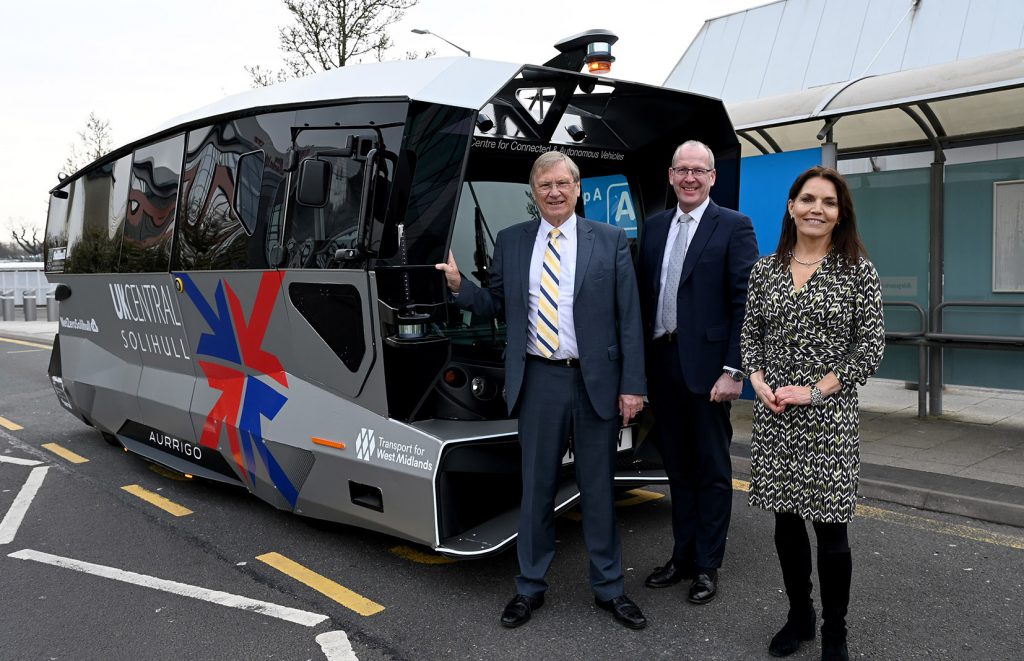Aurrigo takes off with first autonomous shuttle trial at Birmingham airport.

A driverless shuttle, owned by Solihull Council and designed and built in Coventry, made its
debut in the grounds of a UK airport for the first time this week.
Aurrigo, which employs over 70 people at its Advanced Engineering Centre, will deploy its
10-seater Auto-Shuttle alongside live traffic on the roads of Birmingham Airport.
The company has mapped out a route that will initially transport staff from the Departures
entrance and Diamond House to Car Park 5, with the potential for the trial to be extended to
passengers later this month.
The zero-emissions autonomous shuttle uses a suite of sensors, including LiDAR, to
understand its surroundings and move safely around its environment.
For the purpose of testing, and in line with current legislation, a safety operator will be onboard
at all times, whilst the shuttle can also be manually driven with conventional controls
to give the ultimate in operational flexibility.
This latest project is an exciting Solihull Council-led initiative to test how Connected
Autonomous Vehicles (CAVs) might be integrated into the borough’s transport network in the
future and follows a successful trial at the National Exhibition Centre last year.
Miles Garner, Sales & Marketing Director at Aurrigo, explained: “We are delighted to be
working with Solihull Council again to deliver another milestone, with Birmingham Airport
becoming the first ever Airport to test our autonomous shuttles passenger side on their
roads.
“Aviation is a major opportunity for Aurrigo, with a genuine desire to find new technologies
that can improve the passenger experience. This could be through our driverless shuttles,
our Auto-Sim modelling software or it could be through our Auto-Dolly cargo/luggage dolly
that can replace the traditional tugs that are commonplace in airports all over the world.”
He continued: “We are currently working on projects at Changi Airport in Singapore and
Gerald R. Ford International in North America, putting the UK on the global map for
autonomous technology deployment.”
Nick Barton, Chief Executive of Birmingham Airport, added his support: “Autonomous
technology promises enormous benefits to airports and the service companies that support
them, with the potential to transform the way we work and improve efficiency and safety for
passengers, staff and other airport users.
“We are really excited to be working with Solihull Council on this trial, which will provide us
with invaluable insight into how we can start to safely incorporate CAVs into our vehicle fleet.
This trial of fully electric vehicles, and testing their capabilities on site, is making sure we are
working towards our net zero carbon target by 2033.”
Aurrigo has been creating headlines in the aviation sector after using its Auto-Sim
technology to help Changi Airport in Singapore with development work on a new terminal.
The company, which was founded by brothers David and Graham Keene nearly 30 years
ago, has also used its in-house software, technology and engineering expertise to develop
the Auto-Dolly, a new autonomous luggage and cargo system that has the potential to
deliver 60% carbon savings for airports.
It is anticipated that the digital twin modelling work could prove the business case for these
dollies to replace conventional diesel-powered luggage and cargo tractors and trailers by two
thirds.
Councillor Ian Courts, Leader of Solihull Council, concluded: “CAV technology has the
potential to revolutionise the way we get around our towns, cities and rural areas as well as
transport goods. I’m excited that we are the first Council in the country to purchase our very
own zero-emission, road-legal, shared use Connected Autonomous Vehicle and we are
keen to put it to use.
“This project is all about looking at how we can practically and safely start to incorporate
autonomous vehicles into our future transport infrastructure. Already one of the bestconnected
destinations in the UK and Europe, Birmingham Airport is the perfect place to trial
our shuttle providing us with a busy but controlled environment in which to gain further realworld
operating experience.”
This project forms part of the wider West Midlands Combined Authority (WMCA) funded UK
Central investment programme, which is delivering a wide range of projects, from walking
and cycling improvement schemes through to town centre redevelopments and build on the
establishment of the Midlands Future Mobility testbed.
For more information, please visit www.aurrigo.com or follow @aurrigotech on twitter